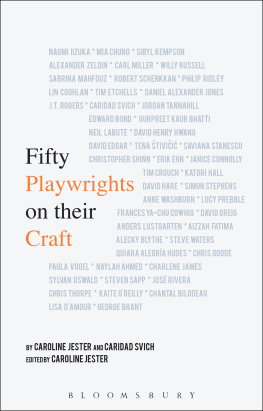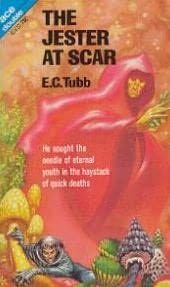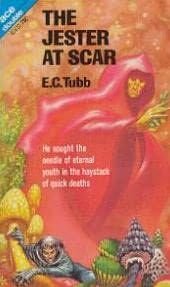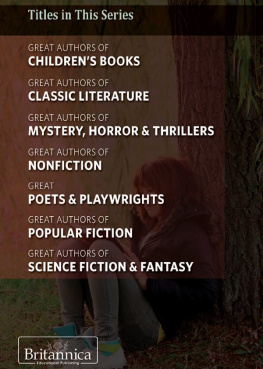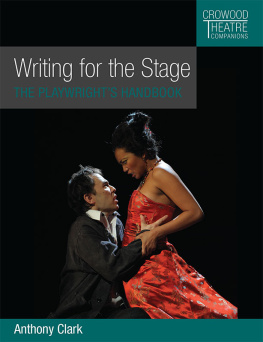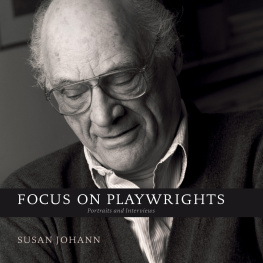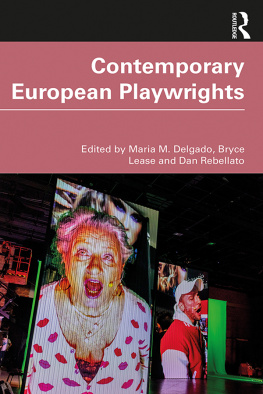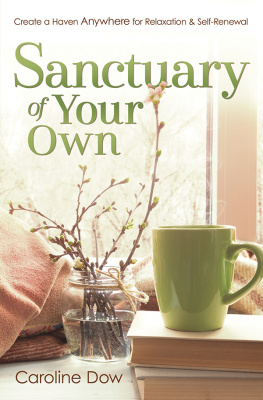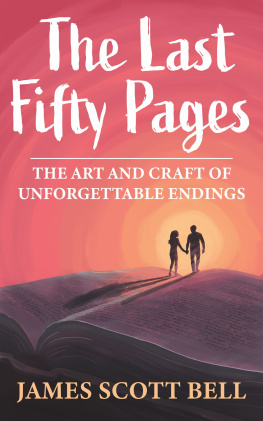Caroline Jester - Fifty Playwrights on Their Craft
Here you can read online Caroline Jester - Fifty Playwrights on Their Craft full text of the book (entire story) in english for free. Download pdf and epub, get meaning, cover and reviews about this ebook. year: 2017, publisher: Bloomsbury UK, genre: Art. Description of the work, (preface) as well as reviews are available. Best literature library LitArk.com created for fans of good reading and offers a wide selection of genres:
Romance novel
Science fiction
Adventure
Detective
Science
History
Home and family
Prose
Art
Politics
Computer
Non-fiction
Religion
Business
Children
Humor
Choose a favorite category and find really read worthwhile books. Enjoy immersion in the world of imagination, feel the emotions of the characters or learn something new for yourself, make an fascinating discovery.
- Book:Fifty Playwrights on Their Craft
- Author:
- Publisher:Bloomsbury UK
- Genre:
- Year:2017
- Rating:3 / 5
- Favourites:Add to favourites
- Your mark:
- 60
- 1
- 2
- 3
- 4
- 5
Fifty Playwrights on Their Craft: summary, description and annotation
We offer to read an annotation, description, summary or preface (depends on what the author of the book "Fifty Playwrights on Their Craft" wrote himself). If you haven't found the necessary information about the book — write in the comments, we will try to find it.
Fifty Playwrights on Their Craft — read online for free the complete book (whole text) full work
Below is the text of the book, divided by pages. System saving the place of the last page read, allows you to conveniently read the book "Fifty Playwrights on Their Craft" online for free, without having to search again every time where you left off. Put a bookmark, and you can go to the page where you finished reading at any time.
Font size:
Interval:
Bookmark:


We would like to thank all of the playwrights who have been so generous with their time and wisdom in order to make this book possible. We are also grateful to Anna Brewer for her vision to connect both sides of the Atlantic and everyone at Bloomsbury Methuen Drama. Caridad would like to thank Zac Kline and R. Alex Davis for their invaluable work recording and transcribing some of the interviews, and Rachel Dart who has been super with everything; her special thanks go to Christopher Shinn. Caroline would like to thank Micheline Steinberg for continued support.
Caroline Jester
What do you get when you put twenty-five British and twenty-five American playwrights together? Or should that be twenty-five American and twenty-five British playwrights? Not everyone calls themselves a playwright so how can we collect all of these people together in just one book? Shouldnt the theater makers be somewhere else? And how has a poet found her way in here? I think Ive just spotted a painter as well, and even some who call themselves artists who write for live performance. And dont forget the musicians and the screenwriters. That one has moved into the gaming industry; she clearly needs to be removed. You cant be called a playwright if you enter the digital world.
But the aim of this book isnt to create chaos and confusion. What all of these playwrights have in common is that they write plays and need a live audience to experience them.
Caridad Svich and I interviewed fifty playwrights on both sides of the Atlantic over the course of one year that has seen what could be described as a paradigm shift. The United Kingdom is leaving the European Union and the man nobody thought would become the Republican Partys Presidential Candidate is now the President of the United States. Each day brings more talk of division, whether that is debate around how to come out of a single market or building walls around countries. What we hope is that this book will celebrate the diversity that exists in both countries within the craft of playwriting. Craft in this book means the skill and understanding the playwrights have in turning their ideas into plays.
There are many divisions within the theater industry and labels that are put on plays and artists that create them. We want to move away from this and put playwrights together who wouldnt usually be found next to each other in one collection.
If theater, as described in this book, has one foot in the past and one in the present with an eye on the future, then an intergenerational dialogue between playwrights could unpick some of the divisions and labels that are created. Given that theater is a dialectical form, dont we need to listen to all perspectives? If this is what playwrights do in their plays, cant we learn from the artform and apply this to the wider conversations around the industry?
All fifty playwrights were asked three core questions:
What is a playwright?
Does the audience influence your work?
How do playwriting and the playwright fit into the digital age of storytelling?
What you wont discover is a definitive answer to any of these questions but fool might be one of my favourite answers to question 1. And the audience isnt a homogenous group of people either. The relationship each playwright has with their audience differs as greatly as the people who share the finished play. But it is one of the most important relationships because the playwright needs the audience, even if they dont always think about them when they are writing. Can the playwright and their work continue to find a relevance in an age of digital media? It could be argued that, given the events noted above, there has never been a greater need in our very recent history to come together and explore multiple points of view.
Finding a way to structure this book has been difficult. The very act of structuring could be seen as trying to label and categorize the playwrights. Most of the playwrights in this book could easily cross over into other chapters but we had to find a way to focus the conversations. Going back to the craft of playwriting became our starting point and each chapter has a central question.
Chapter 1 tries to find out if the ideas that eventually become the plays start from the same place. How does a playwright know which thought, image, or feeling to follow? Chapter 2 is concerned with how those ideas are structured to become the play, and the extent to which where these are staged influences how they are told. Chapter 3 attempts to gain an insight into the playwright who crosses into other artforms. Do such shifts help or hinder the craft of playwriting, and why is there an assumption that being a playwright comes before any other form of storytelling, that you have to be a playwright before you can be a screenwriter or a poet or a painter? Crossing national borders and the increasing difficulty involved in doing so concerns the next ten playwrights in Chapter 4, not from the perspective of whether they need a visa to see productions of their own work but whether theres something within stories that helps them move more easily through borders than humans? And we end by asking in Chapter 5 whether the playwright should be responsible for anything else other than writing the play.
As you will discover, playwrights like to break rules. Edward Bond was interviewed for the final chapter but didnt follow the structure we were creating for the book of questions and answers. It feels more appropriate therefore to put this interview at the beginning. His play Saved was instrumental in the abolition of theater censorship in the United Kingdom and without it, who knows if all of the plays from the playwrights in this book would have ever found an audience? It also feels appropriate to have a playwright lead the conversation. Our roles as curators perhaps are now over. And as there are many forms of censorship, Edward Bonds introduction feels almost a call to arms with an eye to what the future could be if we fail to connect with the past, in the present.
There is a short biography at the beginning of each interview to enable you to discover more about each playwright. US spelling and style has been chosen for ease of reading and is broadly reflective of general cultural trends where US English is more widely recognized and utilized. Our vision for this book is to cross as many borders as we can.
I hope you enjoy the conversations as much as Caridad and I have enjoyed the privilege of talking with all of the playwrights. Caridad sums up my feelings about the artform:
There are many kinds of theater, they can all co-exist.
Its a plural form.
It is a bastard form, magpie already, hybrid by nature, in a good way, between the church and the whorehouse.
Anything is possible.
And I hope this book gives you an insight into the plurality of approaches that exist from the fifty playwrights that appear in this one book and who are making theater across the world.
Edward Bond
Edward Bond is internationally regarded as the UKs greatest and most influential playwright. He is the author of some seventy plays, among them Saved (1965), the production of which was instrumental in the abolition of theater censorship in the United Kingdom. His other plays include: The Popes Wedding (Royal Court, 1962); Early Morning
Next pageFont size:
Interval:
Bookmark:
Similar books «Fifty Playwrights on Their Craft»
Look at similar books to Fifty Playwrights on Their Craft. We have selected literature similar in name and meaning in the hope of providing readers with more options to find new, interesting, not yet read works.
Discussion, reviews of the book Fifty Playwrights on Their Craft and just readers' own opinions. Leave your comments, write what you think about the work, its meaning or the main characters. Specify what exactly you liked and what you didn't like, and why you think so.

